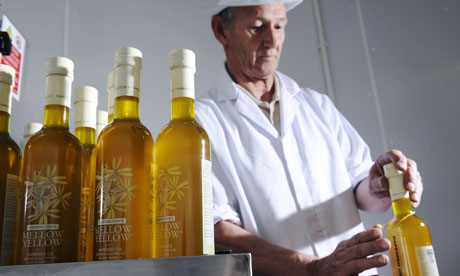
Rapeseed is suddenly big business. There was news the other day that so much of the British countryside is now devoted to the crop, Japanese tourists, bored with cherry blossom, are apparently flocking here to see it bloom. Prices are higher than ever before, and the country is growing 6% more than it did last year. British production has risen from a few thousand tonnes in the 1970s to a couple of million today, more or less doubling in the last 10 years alone.
And in the last few years there's been a surge in artisanal, British, "cold-pressed" rapeseed oils, which are marketed much like single-estate olive oils. You can't go to a food festival or farmers' market without seeing the stuff on sale. Duncan Farrington, who helped to start this process when he launched one of the first such bottles in 2005, turned over £1m last year from his Northamptonshire farm. He tells me his company grew 94% on last year.
What has prompted this sudden interest in an unfortunately named brassica? The word derives from the Latin for turnip, as it happens, and the Romans probably introduced rapeseed to this country. But its popularity waned until the Middle Ages, when people worked out that was a good "break" crop to keep weeds down and improve the soil. During the industrial revolution the oil was used to lubricate steam engines, but although people fed the plant to animals for centuries, it was rarely eaten by humans. The old strains were horribly bitter and contained high levels of something called erucic acid, which is toxic, especially for young children. In 1956, the American FDA banned rapeseed from the human food chain altogether.
In the 1970s, farmers developed strains of rapeseed with low and, in the American parlance, "generally recognized as safe" levels of erucic acid. They also found ways to treat it and remove the unpalatable bitterness. Many of these innovations arose in Canada, which has a good climate for growing rapeseed, and in 1978 the splendidly named Western Canadian Oilseed Crushers Association registered a product called "canola", a somewhat Draperish portmanteau of "Canadian Oil, Low Acid".
Doggedly marketed in an environment where traditional fats such as butter were on the wane, canola became very popular in North America. The European Community (as was) offered large subsidies to farmers growing rapeseed through the 1980s. In the UK, where its name rather works against it, commodity rapeseed oil is usually sold as vegetable oil. They make it by extracting oil from the seeds at high temperature and using solvents and chemicals to bleach, degum and deodorise the product. The result is a bland, neutral and useful bog-standard kitchen oil, though personally I usually buy sunflower or groundnut in its stead.
It's relatively healthy stuff, with 7% saturated fat compared to 14% in olive oil or 51% in butter. It's also high in those trendy and generally misunderstood compounds, omega-3 and omega-6. If a retailer bothers to list the provenance, it's likely to be British. Unlike olive oil, rapeseed doesn't go toxic at high heat, while a smoke point higher than that of olive oil makes it marginally more suitable for deep-frying. (Though anyone prepared to deep-fry in high-end rapeseed oil or olive oil is mad anyway.)
As a result, and in pursuit of the new as they always are, a number of serious chefs are turning to it. Perhaps the most feted chef currently working in London, Ollie Dabbous, uses it in a dazzling dish of asparagus, hazelnuts and meadowsweet. Tristan Welch of Launceston Place, Gary Jones of Le Manoir and Mark Sergeant all use it in their kitchens or serve it as dipping for bread. It's great that they're using a carefully made, high-end British product in their kitchens, but it does seem to me a case of the emperor's new lube.
I've got a bottle from one of the main British producers of posh rapeseed oil. It's a glorious, shocking yellow but it smells rather dusty and cabbagey. The taste is simultaneously bland and tongue-coatingly unpleasant; it reminds me of rancid walnuts and second-hand bookshops. Dabbous is probably right to put this stuff in mayonnaise, where olive oil will often overpower things. But in a salad dressing it's so much cold wet grease, and I don't see the point of cooking with something so comparatively expensive. What do you think?

